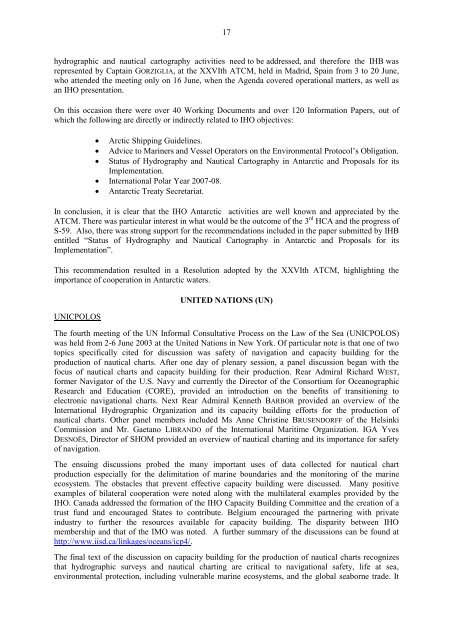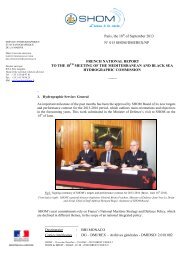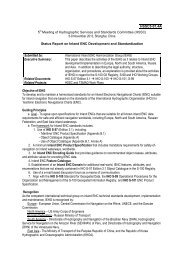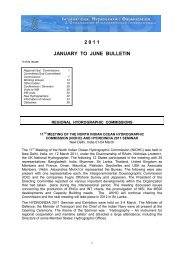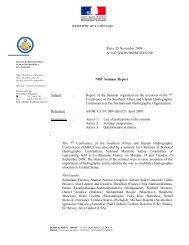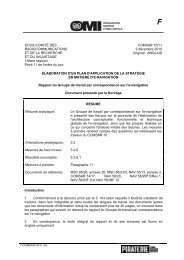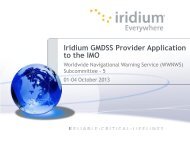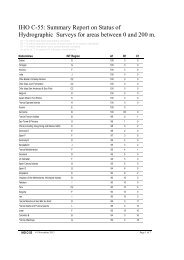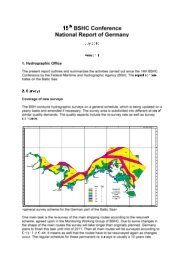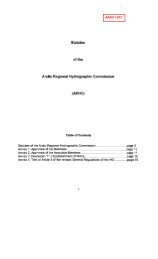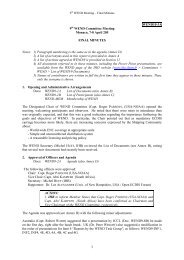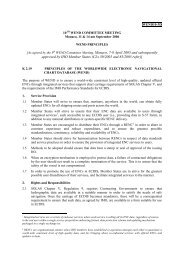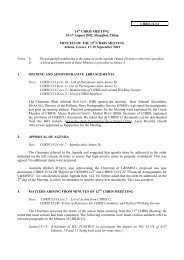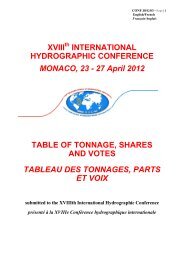international hydrographic organization 2003 - IHO
international hydrographic organization 2003 - IHO
international hydrographic organization 2003 - IHO
Create successful ePaper yourself
Turn your PDF publications into a flip-book with our unique Google optimized e-Paper software.
17<br />
<strong>hydrographic</strong> and nautical cartography activities need to be addressed, and therefore the IHB was<br />
represented by Captain GORZIGLIA, at the XXVIth ATCM, held in Madrid, Spain from 3 to 20 June,<br />
who attended the meeting only on 16 June, when the Agenda covered operational matters, as well as<br />
an <strong>IHO</strong> presentation.<br />
On this occasion there were over 40 Working Documents and over 120 Information Papers, out of<br />
which the following are directly or indirectly related to <strong>IHO</strong> objectives:<br />
<br />
<br />
<br />
Arctic Shipping Guidelines.<br />
Advice to Mariners and Vessel Operators on the Environmental Protocol‟s Obligation.<br />
Status of Hydrography and Nautical Cartography in Antarctic and Proposals for its<br />
Implementation.<br />
International Polar Year 2007-08.<br />
Antarctic Treaty Secretariat.<br />
In conclusion, it is clear that the <strong>IHO</strong> Antarctic activities are well known and appreciated by the<br />
ATCM. There was particular interest in what would be the outcome of the 3 rd HCA and the progress of<br />
S-59. Also, there was strong support for the recommendations included in the paper submitted by IHB<br />
entitled “Status of Hydrography and Nautical Cartography in Antarctic and Proposals for its<br />
Implementation”.<br />
This recommendation resulted in a Resolution adopted by the XXVIth ATCM, highlighting the<br />
importance of cooperation in Antarctic waters.<br />
UNICPOLOS<br />
UNITED NATIONS (UN)<br />
The fourth meeting of the UN Informal Consultative Process on the Law of the Sea (UNICPOLOS)<br />
was held from 2-6 June <strong>2003</strong> at the United Nations in New York. Of particular note is that one of two<br />
topics specifically cited for discussion was safety of navigation and capacity building for the<br />
production of nautical charts. After one day of plenary session, a panel discussion began with the<br />
focus of nautical charts and capacity building for their production. Rear Admiral Richard WEST,<br />
former Navigator of the U.S. Navy and currently the Director of the Consortium for Oceanographic<br />
Research and Education (CORE), provided an introduction on the benefits of transitioning to<br />
electronic navigational charts. Next Rear Admiral Kenneth BARBOR provided an overview of the<br />
International Hydrographic Organization and its capacity building efforts for the production of<br />
nautical charts. Other panel members included Ms Anne Christine BRUSENDORFF of the Helsinki<br />
Commission and Mr. Gaetano LIBRANDO of the International Maritime Organization. IGA Yves<br />
DESNOËS, Director of SHOM provided an overview of nautical charting and its importance for safety<br />
of navigation.<br />
The ensuing discussions probed the many important uses of data collected for nautical chart<br />
production especially for the delimitation of marine boundaries and the monitoring of the marine<br />
ecosystem. The obstacles that prevent effective capacity building were discussed. Many positive<br />
examples of bilateral cooperation were noted along with the multilateral examples provided by the<br />
<strong>IHO</strong>. Canada addressed the formation of the <strong>IHO</strong> Capacity Building Committee and the creation of a<br />
trust fund and encouraged States to contribute. Belgium encouraged the partnering with private<br />
industry to further the resources available for capacity building. The disparity between <strong>IHO</strong><br />
membership and that of the IMO was noted. A further summary of the discussions can be found at<br />
http://www.iisd.ca/linkages/oceans/icp4/.<br />
The final text of the discussion on capacity building for the production of nautical charts recognizes<br />
that <strong>hydrographic</strong> surveys and nautical charting are critical to navigational safety, life at sea,<br />
environmental protection, including vulnerable marine ecosystems, and the global seaborne trade. It


